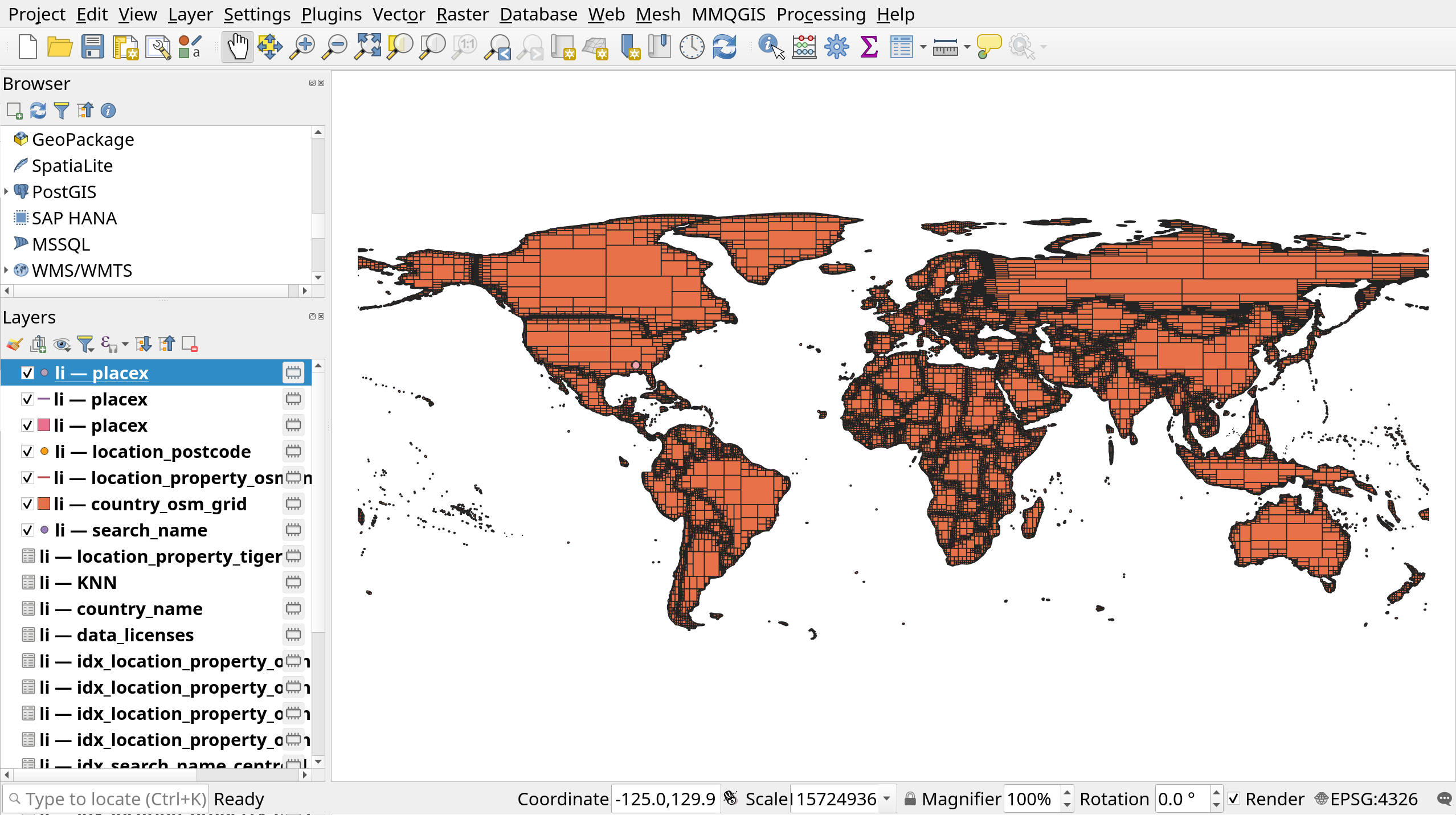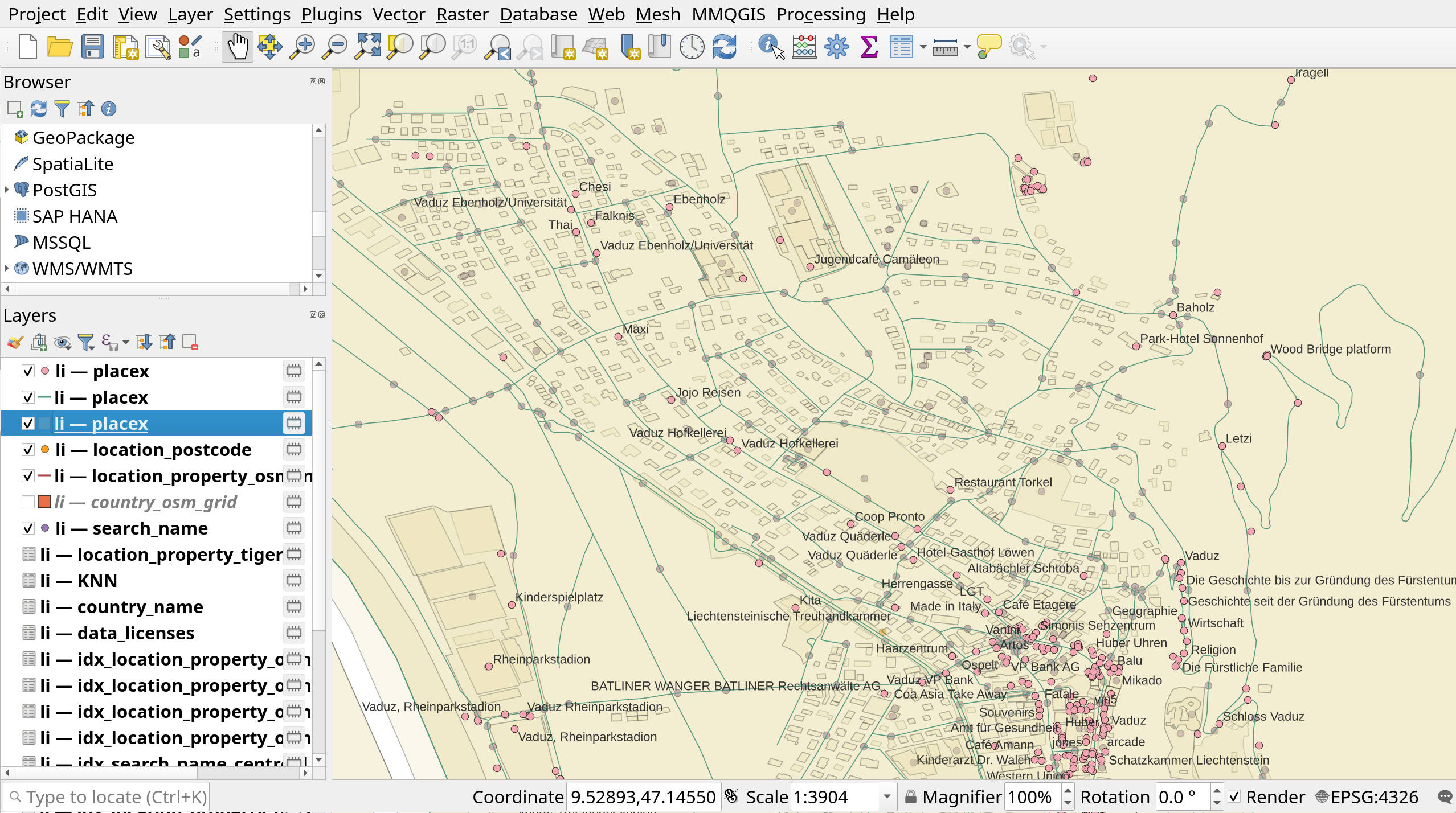NominatimLite - the database
Quite a bit has happened in the last years to make Nominatim work well with with less powerful hardware. One aspect of this is keeping its database small. But is it small enough that Nominatim fits into a tiny SQLite database? With the newly introduced SQLAlchemy, we can find out.
SQLAlchemy is a very fine piece of software and a powerful library for anybody who needs to work with SQL databases in Python. It can be used as a fully-featured ORM or as a simple SQL toolkit. It’s doing quite a good job in integrating SQL queries with Python code. For the frontend renovation project, it will replace the many lines of hand-written SQL. The library also functions as an abstraction layer between the SQL dialects offered by the different SQL databases. This makes it easy to start playing around with other databases, in our case SQLite.
Database-agnostic table schemas
Since about a week, Nominatim’s master branch contains SQLAlchemy table definitions, for Nominatim’s search tables. They were generated semi-automatically with the help of the sqlacodegen tool from an existing Nominatim database. Reviewing the code, we find that Nominatim uses three column types that are PostgreSQL-specific:
- HSTORE - a simple key-value store
- INTARRAY - an array of integers
- JSONB - a more compact binary representation of a json composite type
Luckily all these types can be easily represented by the JSON composite datatype which is natively supported by SQLite. So, a little bit of type-aliasing makes the table definition usable for PostgreSQL and SQLite:
if engine_name == 'postgresql':
Composite: Any = HSTORE
Json: Any = JSONB
IntArray: Any = ARRAY(Integer)
elif engine_name == 'sqlite':
Composite = JSON
Json = JSON
IntArray = JSON
Nominatim builds on a PostGIS database. So for SQLite we also need its geospatial variant SpatialLite. The geospatial extension GeoAlchemy2 supports SpatialLite out-of-the-box, so no adaptions were needed to the table schema with regard to geometries.
Dumping Nominatim into SpatialLite
Now that we have a schema that works with both database flavours, we can write a simple script to copy data over row by row:
import sqlalchemy as sa
# Access and schema in source database
indb = sa.create_engine('postgresql:///nominatim')
inmeta = sa.MetaData()
SearchTables(inmeta, 'postgresql')
# Access and schema in destination database
outdb = sa.create_engine('sqlite:///nominatim.sqlite'))
outmeta = sa.MetaData()
SearchTables(outmeta, 'sqlite')
with indb.begin() as inconn, outdb.begin() as outconn:
# Create the tables in our destination database.
outmeta.create_all(outconn)
# Copy all tables row for row.
for table in inmeta.sorted_tables:
print(f"Copying '{table}'")
for row in inconn.execute(table.select()):
params = row._asdict()
if 'class' in params:
params['class_'] = params['class']
outconn.execute(outmeta.tables[table.key].insert(), params)
That’s almost it. SpatialLite is an extension to the standard SQLite database and needs a bit of additional setup before it can be used. GeoAlchemy2 has the details. To make the code above work, add SpatialLite initialisation as follows:
def load_spatialite(dbapi_conn, connection_record):
dbapi_conn.enable_load_extension(True)
dbapi_conn.load_extension('/usr/lib/x86_64-linux-gnu/mod_spatialite.so')
sa.event.listen(outdb, 'connect', load_spatialite)
with outdb.begin() as conn:
conn.execute(sa.select(sa.func.InitSpatialMetaData()))
A Nominatim database of Liechtenstein (around 100MB) can be converted in about 30s. That’s not bad for such a simplistic dump script.
A quick check with QGIS confirms that the geospatial data shows up as expected:

What you see here are the fallback geometries for countries. Nominatim uses them in places, where no other data is available. That is why there is global coverage for countries. If we zoom in into Liechtenstein’s capital Vaduz, we can see that the other data has been converted successfully as well including names:

Ready to use? Not quite.
This was a first experiment with Nominatim and SQLite. It’s not the final database yet. The table schema definitions do not yet contain the proper definitions for indexes, so SQLAlchemy will have defined a couple of indexes but not the ones actually needed for searching. In fact, indexes are going to be one of the major challenges going ahead. The main search index in Nominatim is implemented as an index over the INTARRAY type. It functions as an efficient replacement for an inverted index. For SQLite we will have to come up with a different solution.
In the coming months we port the forward and backward search functions to SQLAlchemy and Python. This will be the true reality check for NominatimLite.